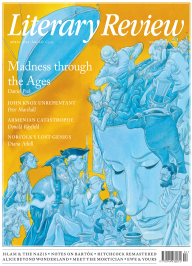Michael Eaude
Chaotic City
The Seven Madmen
By Roberto Arlt (Translated by Nick Caistor)
Serpent’s Tail 323pp £8.99
The greatness of Roberto Arlt lies in his energy, his nightmarish descriptions of the modern city that crushes the poor’s dreams and his portrayal of madness – or divided souls. The Seven Madmen, published in 1929 and the best known of his four novels, is also a prescient parable of the rise of fascism. Its first impression is of sprawl and repetition – written, as critics joked, by an eighth madman. The impression is enhanced by the disordered lives and ideas of the book’s characters.
Born in 1900, son of immigrants from eastern Europe to Argentina, Arlt was a contemporary of Borges. The latter’s vast erudition, polished gems and longevity have given him a reputation that has outshone most other Argentine writers. Arlt was self-educated and colloquial in his style, something of a rough diamond, an anti-Borges. In his day a renowned journalist and short-story writer, he died suddenly in 1942. This edition contains critical afterwords by Roberto Bolaño and Nick Caistor, who has done a fine job translating Arlt’s unorthodox syntax and colloquialisms.
Argentina, after removing its indigenous peoples, invited immigration from Europe. By the 1920s, cattle and wheat had placed it among the top ten wealthiest nations in the world. Buenos Aires was a huge city of boulevards, elegant blocks of flats and an impoverished working class – all the virtues and

Sign Up to our newsletter
Receive free articles, highlights from the archive, news, details of prizes, and much more.@Lit_Review
Follow Literary Review on Twitter
Twitter Feed
The era of dollar dominance might be coming to an end. But if not the dollar, which currency will be the backbone of the global economic system?
@HowardJDavies weighs up the alternatives.
Howard Davies - Greenbacks Down, First Editions Up
Howard Davies: Greenbacks Down, First Editions Up - Our Dollar, Your Problem: An Insider’s View of Seven Turbulent...
literaryreview.co.uk
Johannes Gutenberg cut corners at every turn when putting together his bible. How, then, did his creation achieve such renown?
@JosephHone_ investigates.
Joseph Hone - Start the Presses!
Joseph Hone: Start the Presses! - Johannes Gutenberg: A Biography in Books by Eric Marshall White
literaryreview.co.uk
Convinced of her own brilliance, Gertrude Stein wished to be ‘as popular as Gilbert and Sullivan’ and laboured tirelessly to ensure that her celebrity would outlive her.
@sophieolive examines the real Stein.
Sophie Oliver - The Once & Future Genius
Sophie Oliver: The Once & Future Genius - Gertrude Stein: An Afterlife by Francesca Wade
literaryreview.co.uk